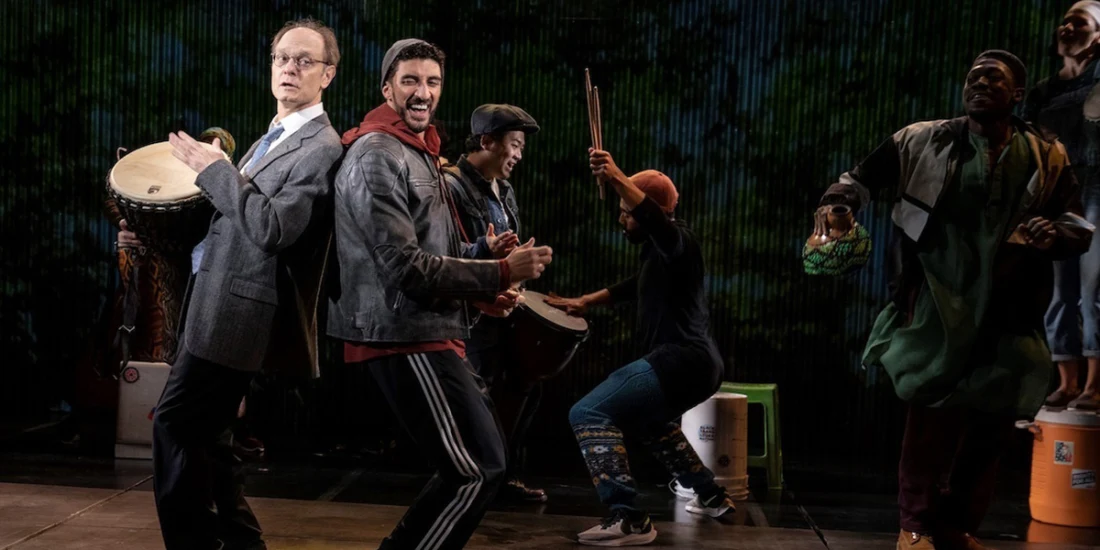'The Visitor' review - a well-intentioned, yet out-of-touch musical
There has been much drama around The Visitor, the new Tom Kitt, Brian Yorkey, and Kwame Kwei-Armah musical. The show's opening last year was delayed because of the COVID-19 pandemic. Then when it was scheduled to return this fall, the first two preview performances of the musical were postponed to, per the Public's statement, "accommodate for more time for the company to address questions about race, representation, and identity." Then one of The Visitor's stars, Tony winner Ari'el Stachel, departed the musical. Why would Stachel, who had been part of the musical's development process for six years, leave it right before opening night?
There is a possible answer, and it points to the fundamental flaw in The Visitor itself.
The Visitor, based on the 2007 film of the same name, follows college professor Walter, who is white and suffering from grief at the death of his wife. Through chance, he meets Syrian refugee Tarek, who is at risk of being deported. Through Walter's attempt to keep Tarek in America, Walter learns how to connect with other human beings again.
When The Visitor was released in 2007, it was the rare attempt to humanize Muslims in the eyes of Americans, during a time when Muslims were demonized in the media, while the American military pillaged Afghanistan and Iraq. And because it was 2007, it was common to have a white narrator be the eyes for the audience, to translate this "foreign" world of immigration, political asylum, and ICE custody to them.
In 2021, the same story with the same white narrator has turned this entreaty for humanity into a white savior narrative that, while well-intentioned, is woefully out of touch.
The musical opens with Walter, played by Emmy winner David Hyde Pierce, going through the motions while teaching. Walter then meets Tarek (played by Ahmad Maksoud, who was Statchel's understudy), Tarek's girlfriend Zainab, a refugee from Senegal (Alysha Deslorieux), and Tarek's mother Mouna (Jacqueline Antaramian). Each of the immigrant characters have a compelling narrative about why they came to America, what happened in their homeland, and how much they've suffered because of America's inhumane immigration system. Yet you won't find much from them in terms of character development.
Instead, the focus is on Walter and his interiority, how Tarek being imprisoned by ICE has opened Walter's eyes to the rot and hypocrisy of America. The people of color in the story are constrained to being side characters, nobly suffering. While Walter is given a career and character motivations, by contrast, Tarek is only given broad strokes of a characterization: He loves Zainab and plays the drums. But not much is given about what his dreams are, how he met Zainab, why he needs to play music. Walter is given a character arc while Tarek, who is facing deportation back to Syria, is constrained to nobly suffering.
Sure, one man learned about U.S. immigration law and was woken up by it, but another man is about to lose his home and will be sent back to a war-ravaged country. The stakes are markedly different and it is The Visitor's fatal flaw that it tries to even place them on an equal playing field.
This is not the fault of the actors. Pierce is sensitive and likeable as Walter, his sad eyes truly pierce your soul. It is a testament to Pierce's likability that his ignorance about the injustice of the American immigration system comes off as naive instead of, well, privileged.
Maksoud portrays Tarek with a surface level of depth: Tarek's scenes in ICE detention are played with resignation, lacking any emotional punch. But considering that Maksoud was the understudy, perhaps his performance will feel more lived-in with time.
The women of the cast are the ones who truly shine. A highlight of the show is their affecting duet "Lady Liberty," with lyrics like "You say give me your tired, your poor. Well we've got more. They knock, but you're not at the door," with equal parts tenuous hope and bitter cynicism. As portrayed by Antaramian and Deslorieux, with a steel spine and intelligence, these women are not simple victims. They are survivors.
But it is notable that none of the immigrant characters in the story are ever truly angry at the injustice of their circumstances. Instead it is Walter who is allowed to be angry, in his 11 o'clock number where he sings out in a rallying cry: "We must find our better angels. And our country's stolen soul. And remember where we came from. And make what's broken whole."
Who is the "we" here? Because for many immigrants, Black people, and people of color, America's better angels never existed.
The Visitor expects white rage and white awareness to be worth applauding. But we've gone past the time when awareness and rage is a milestone. The U.S. has kept migrant children in cages, Syrian refugees drowned at sea trying to escape war: The time has passed for raising awareness. It is time to take that rage and put it into action.
That is not to say The Visitor needs to include a call-to-action for fixing America's broken immigration system. But the musical's narrow focus just shows how ill equipped it is for meeting the current moment.
The Visitor ends with Walter sitting in an empty apartment, his new friends having left. He has seen true suffering but can remove himself from it and be, ultimately, unburdened of it. That is privilege. The other characters, their suffering and their stories will continue far beyond the final song. It is those stories that deserve to be told.
Originally published on
